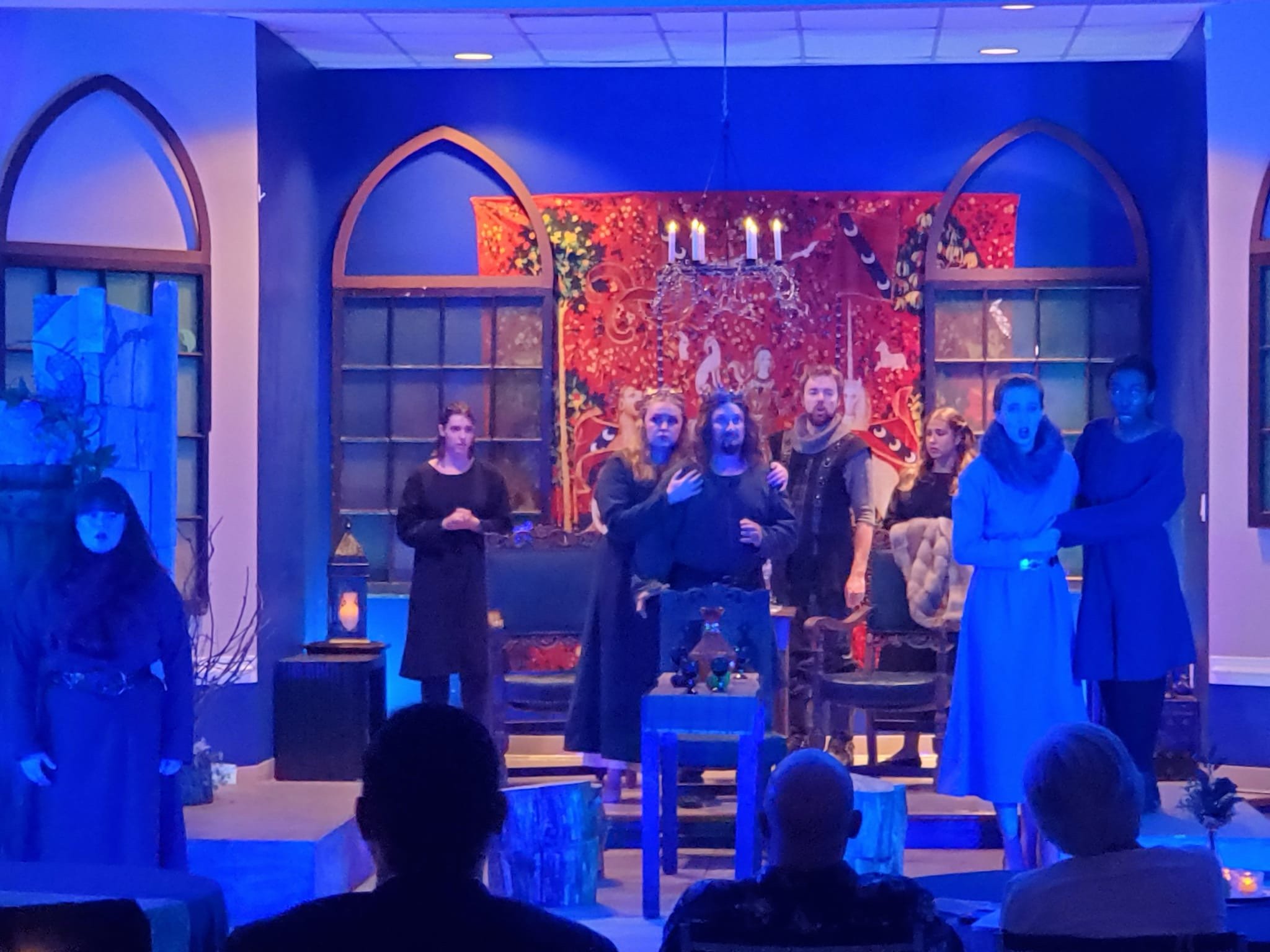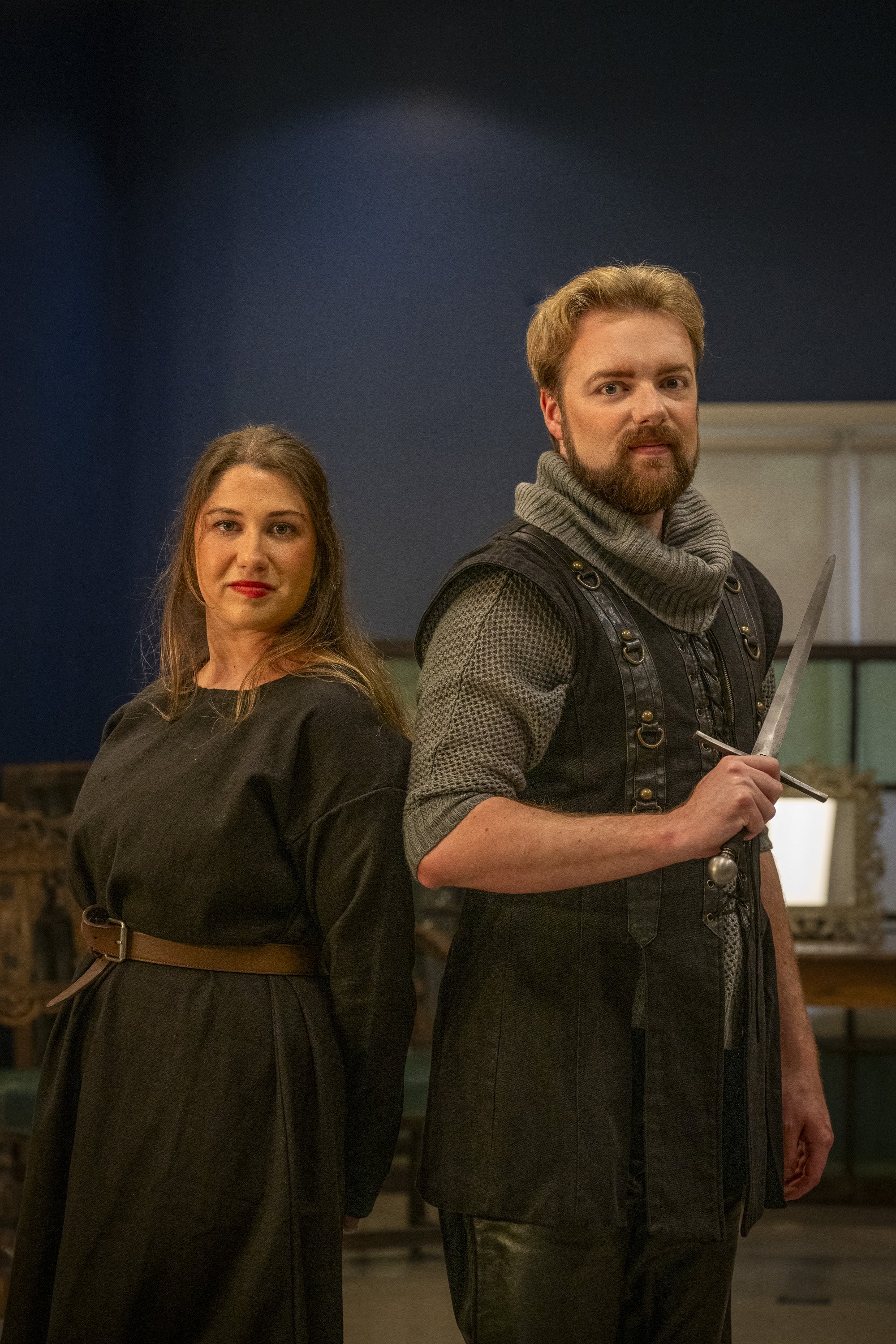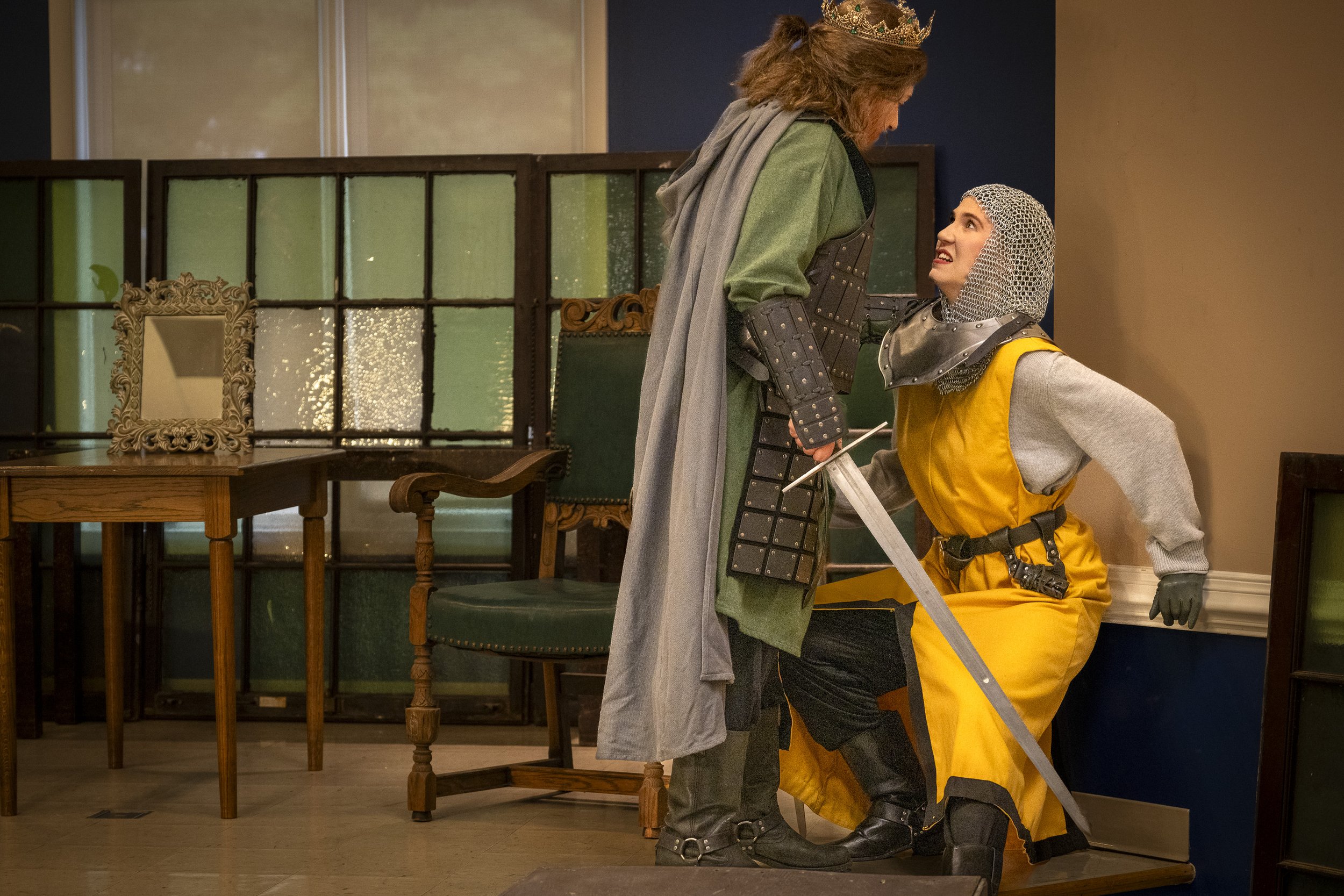Shakespeare Opera Theatre is a small community opera with rising expectations. Founder and Managing Director Lori Lind has created a bold and ambitious new blending of elements of Shakespeare’s play with Verdi’s marvelous music from his Macbeth. Unfortunately, Friday night’s opening could have been titled “toil and trouble”. It was beset with a witch’s brew of problems leading up to its debut. Half of the cast and staff came down with illness or injuries. The ensemble was unable to practice together for the five days preceding the premiere. Many last-minute role changes and staff changes had been required, leading to finicky special effects equipment and a failure of the subtitles to arrive. Dr. Lind talked about these challenges in her opening comments; she said she had even gone so far as to stop encouraging people to attend the premiere, which de facto had become the dress rehearsal. She encouraged the audience to enjoy the show as presented; after all, she said, “it’s just opera”. Her straightforward honesty and down to earth attitude elicited understanding in the audience and an appreciation for the “show-must-go-on” spirit of everyone involved. There were rough spots and mistakes to be sure, but even with the issues that arose, there was much to enjoy in this production. It was an entertaining evening, and future audiences will of course get a more polished performance.
Cast scene in SOT’s Macbeth. Photo by Lori Lind; courtesy of Shakespeare Opera Theatre.
Founder Lind originally trained to be a Shakespearean actor, but then became an opera singer (note: she won the Annapolis Opera annual singing competition in 2005 and is currently the Organist and Choirmaster for St. Thomas Episcopal Church in McLean, VA). After touring the globe, she came to settle in northern Virginia and decided to start a company that combined her two loves, Shakespeare and opera; the company will be celebrating its tenth anniversary in 2025. Macbeth tells a story of the corrupting influence of lust for power that compels Lady and Lord Macbeth to commit murder to ascend to become queen and king of Scotland in the 11th century. Composer Giuseppe Verdi loved Shakespeare’s plays and worked with librettists Francesco Maria Piave and Andrea Maffei to translate the Bard’s work into opera, following the play as closely as they felt they could. In opera, all or almost all of the dialog is sung. Of necessity, this involved deletions and deviations from the source’s plot (singing takes much more time than dialog) and modifications (composing librettos for singing is different than composing dialog for speaking).
JP Gorski as Macbeth and Monica Niemi as Lady Macbeth. Photo by Lori Lind; courtesy of Shakespeare Opera Theatre.
Dr. Lind feels that a significant impact of Shakespeare’s words and storytelling is lost in this process. For SOT’s Macbeth, she sought to combine sections of Shakespeare’s words with sections of Verdi’s vocals and music holding on to the most critical parts of each. She stated, “My goal with Macbeth, as with all of the Shakespeare adaptations I arrange, is to keep to the original Shakespeare story as closely as I can while employing the enhancement of masterful opera composers’ works. Many opera composers cannibalize Shakespeare and add or take away characters. This serves the necessity of time, mostly, but sometimes it's to give an aria to someone or to wrap up a story more neatly in opera conventions. They mess up complex character arcs and leave out complete side plots or the most interesting speeches and couplets."
She mentioned several specific concerns with Macbeth: “Some things are best left unspoiled, like for instance, what I call Verdi's "dudley do-right" music of Malcolm coming in to save the day. That's not what Shakespeare wrote at all, he wrote Malcolm as a very young and untested soldier who needs Macduff, Ross and the Siwards to fight for him. He's hardly the heroic figure that Verdi portrays him to be in that music, and he does not fight Macbeth, but sends others. Macduff even has a tussle with him himself when Malcolm insensitively says: ‘let's get our revenge on that tyrant for killing your family’ without giving the poor man his moment of grief. In that way, Verdi's music for A la paterna mano is a brilliant addition, but it has to be coming out of the Shakespeare scene where he says I will do so like a man (take revenge,) but first, I must feel it like a man (meaning his grief.) Combining the two forces of Shakespeare and Verdi really gives you goosebumps and gets you right in the heart. Then there is something like Macbeth's Tomorrow and tomorrow speech. It's just so meaty in spoken word, adding music to it is gilding the lily!”
left to right: Rick Knight as Lennox, Justin Meyer as Seyton, Quaine Hogan as Macduff, Xavier Flory as Malcolm, and Gene Allen as Old Siward. Photo by Lori Lind; courtesy of Shakespeare Opera Theatre.
Plenty of room there for debate I’m sure, but it is an interesting approach, creating something distinctively different from either work, combining brilliant elements of each. With what modern directors are doing to classic operas these days, I find it an appealing alternative approach, turning classic opera into a classic opera musical, or as Shakespeare Opera Theatre calls it, without apologies, a mash-up. If you like Shakespeare and Verdi, attend and see what you think.
Dr. Lind also served as Stage Director, Production designer and Decorator for Macbeth. SOT performances are fully staged with acting, costumes, sets, and piano accompaniment, the size of the venue places constraints on scene changes and the size of the chorus. The cleverly designed, three part set for Macbeth included a castle wall, a banquet room, and a side chamber, well done. The three witches conjure up their potions atop the castle wall. Lighting and sound effects are created on site with some use of recorded sounds. Shakespeare Opera Theatre utilizes interns backstage; kudos to 16-year-old Qasim Sabir who managed costumes and props and 16-year-old Samuel Lee who was in charge of lights and sounds. Eleven-year-old Amelia Pixton (Mia) who has worked with the company since she was three-years-old performed the drumming and created some thunder sounds, as well as acting as Macduff’s son on stage. The fight scenes were nicely choreographed by Casey Kaleba, though the large swords flying around made me a little anxious for the performers. The company does a lot with a small space to work with. The actor/singers come and go through the sides of the set and down through the audience. It is a very intimate setting, an excellent opportunity to experience the power of operatic singing up close.
Demi Vander Werff as Lady in Waiting and Justin Meyers as Seyton. Photo by Lori Lind; courtesy of Shakespeare Opera Theatre.
Combining two versions of Macbeth increases the roles and players needed. This cast has 14 performers, with many playing more than one role and/or covering other roles. The singers/actors come from across the U.S. with one from Sweden; they all performed well in this “dress rehearsal”. The three witches (soprano Christine Cummins, mezzo-soprano Demi Vander Werff, and Swedish mezzo-soprano Louisa Anderson) were perhaps more charming than scary that evening but were a delight. There are five principal roles in Verdi that get arias: Macbeth, played by baritone JP Gorski; Lady Macbeth, by soprano Monica Niemi; Banquo, by bass-baritone Justin Ramm-Damron; Macduff, by tenor Quaine Hogan; and Malcolm, by tenor Xavier Flory. Each gave a good performance, and I took particular note of Mr. Ramm-Damron and Mr. Hogan. These singers warmed up and gave their most stirring performances later in the drama. Additional performers were Gene Allen as Duncan and Siward, Bryanna Toll in five roles, Neema Meena in three roles, Rick Knight as Lennox and Assassin, Justin Meyer as Seyton, Donette Rimmer as Lady Lennox and Queen Elizabeth I, and of course, Amelia Pixton as Macduff’s son and the Child King. I thought that Justin Meyer as Seyton showed a theatrical flair.
The pianist for the performance was provided by Anh Nguyen, a Doctor of Musical Arts candidate at George Mason University, a recent newcomer to Shakespeare Opera Theatre. I enjoyed the music, and it seemed well coordinated with the singers, though certain sections might have benefited from more finesse. Kudos to the singers in the ensemble vocals and the chorus; these were perhaps my favorite parts of the evening.
JP Gorski as Macbeth confronting Louisa Anderson as Young Siward. Photo by Lori Lind; courtesy of Shakespeare Opera Theatre.
As I said, there was much to enjoy here; the mistakes in this “dress rehearsal” sort of became part of the fun. Alas, scheduling won’t permit, but I wish that I could see it again just for enjoyment. Dr. Lind calls this adaptation a jewel box opera; she has collected jewels from more than one source for a production. Indeed, she has, and for all she does, kudos to Dr. Lori Lind.
The Fan Experience: Performances of Shakespeare Opera Theatre’s Macbeth were scheduled for July 12, 13, and 14 at the St. Thomas Episcopal Church in McLean; additional performances were scheduled for July 20 and 21 at The Grace Episcopal Church in The Plains. The production’s dialog is in English and the vocals are in Italian with subtitles in English. The performance with Dr. Lind’s comments lasted about three hours, and the cast came out to mingle with attendees after the final applause. Given the difficulties noted in the text above, Dr. Lind offered attendees a free ticket to another performance or to another SOT production.
Shakespeare Opera Theatre performs classic works not by Shakespeare as well. Their next production will be another jewel box production, scheduled for December 6-15, titled La Vie de Bohéme, based of course on Puccini’s La Bohéme, which goes extremely well with the holiday season.
SOT’s performances have more of a party atmosphere rather than the church service atmosphere of our major opera halls. I found little pretense with SOT; they readily own their limitations and still managed to engage us fully. Dress is “as you like it” and seating is at tables. Snacks and drinks are offered for sale which can be consumed before, during, or after performances. After a meal of Shakespeare, I frequently recall these words by Puck at the end of A Midsummer Night’s Dream:
If we shadows have offended
Think but this and all is mended
That you have but slumbered here
While these visions did appear
And this weak and idle theme
No more yielding but a dream






